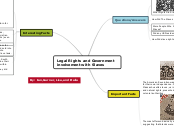Legal Rights and Government involvement with Slaves
Questions/Answers

What Rights Did Slaves Have?
How Did The Slaves Gain Rights?
Were People Who Were Not Christian Considered Slaves?
Did any US Presidents have slaves? If so, how many?
How Did slave rights progress?
Important Facts

The American Revolution was an opportunity to fight for their own independence. From 1773 to 1774 Massachusetts slaves, using the rhetoric of liberty and natural rights, presented petitions for freedom to colonial authorities.

Thomas Jefferson basically started slavery by suggesting that blacks were inferior to whites.
Interesting Facts

Loyalists and Patriots offering freedom in return for service, thousands of slaves took up arms.
According to the colony's 1705 law, all blacks, mulattoes, and Native Americans, all non-Christian persons brought into the colonies as servants (even should they later convert to Christianity) were considered slaves.
Living in a free state did not guarantee freedom for blacks. Free blacks could be kidnapped and sold into slavery. Escaped slaves were forced back into captivity by increasingly stringent fugitive slave laws.
Despite these important gains, blacks in the South faced menacing threats intended to undermine their efforts to become powerful and autonomous within their society. The fourteenth and fifteenth amendments guaranteed black rights, but they did nothing to enforce them.
